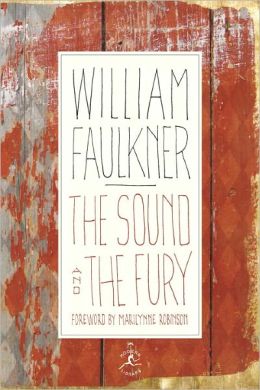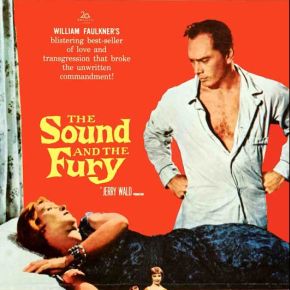
 Among Marilynne Robinson’s many brilliant essays, a 2012 Foreword to the Modern Library’s latest edition
Among Marilynne Robinson’s many brilliant essays, a 2012 Foreword to the Modern Library’s latest edition of The Sound and the Fury particularly struck a chord, the edition a must-buy despite its paint-chipped wood (new south!) cover. Maybe it’s her easy command of language, her gently probing (rather than assertively polemical) style of argument, maybe that it’s one of the few pieces I’ve read on Faulkner’s opus that seems like it takes the novel’s now less-than-in-vogue religious sensibilities seriously. At any rate, the publishers got it right with asking her to do it (see too the JJ Sullivan intro to Absalom, Absalom!). A couple of highlights below:
The [novel’s] Easter setting and the wealth of Christian allusion provide a vocabulary especially suited to evoking perfect innocence and passionate love, even irony serving to dignify the very earthly and bewildered expressions that innocence and love find in this novel… Is poor, murderous Macbeth in his bereavement meant by Shakespeare to be seen as a reliable interpreter [life is “a tale / told by an idiot, full of sound and fury, / Signifying nothing”] of human life? Is that how Faulkner understands him? If the title itself is ironic, if the tale the idiot tells is burdened with significance… then the next question must be what and how the novel signifies.
Robinson’s essay, expressive but always understated, works only to open the novel’s space; she won’t impinge on the reader’s own determination of the novel’s significance, and neither will she view such a novel as something remotely reducible to theme or moral or essay. Like many readers, however – and especially those who don’t shy away from Faulkner’s religious emphases – Robinson points us toward Dilsey, the family’s aging black servant, still point in the Compsons’ spinning world. If we view Faulkner’s novel as an attempt to tell a story, it would turn out that cohesive stories may only be told by those whose self-obsession has been arrested into charitable equipoise:
Dilsey Gibson, the old black servant who, with her family, looks after the Compsons, has no interior monologue that the reader is allowed to overhear. Unlike Quentin and Jason, she has nothing to try to rationalize or justify to herself, no need to deceive herself… The Bible says that love bears all things and endures all things. This language describes Dilsey perfectly, even when the fecklessness and the petty meanness of the Compson household would exasperate a saint… She is constant even though she is not repaid by the thought that even one of them might flourish.
 So the story won’t be the mother’s one of Southern aristocratic respectability (they’re socially, spiritually, and emotionally moribund), nor Quentin’s fantasy of a perpetual virgin sister (altered later to incest), nor Jason’s of end-less material advancement, nor Mr. Compson’s gloomy, self-protective cynicism. Truth, for Faulkner, doesn’t come from Harvard credentials, nor from passion, nor from honesty, nor even from beautiful language. It comes with someone like Dilsey who, free from self-justification and a need to rationalize, has been freed by a (Christian) vision of beginning and end. And amidst the characters’ inability to live properly in time, Dilsey’s sense of an eternal story allows her to live in the present, free too from worries over the practical futility of her love for the children. Of course, ‘frees’ is misleading for a black caretaker in the 1920s: the Christian story could also be used to oppress, and frequently was. And the Compsons mistake, as Robinson points out, her tireless love for merely being a good servant, doing her job. They cannot help but interpret her gift as their due. Yet regardless of how little it accomplishes or how much people recognize it, her love abides, and amidst a disintegrating world, such a love was, for The Sound and the Fury‘s Faulkner, the only rock possible.
So the story won’t be the mother’s one of Southern aristocratic respectability (they’re socially, spiritually, and emotionally moribund), nor Quentin’s fantasy of a perpetual virgin sister (altered later to incest), nor Jason’s of end-less material advancement, nor Mr. Compson’s gloomy, self-protective cynicism. Truth, for Faulkner, doesn’t come from Harvard credentials, nor from passion, nor from honesty, nor even from beautiful language. It comes with someone like Dilsey who, free from self-justification and a need to rationalize, has been freed by a (Christian) vision of beginning and end. And amidst the characters’ inability to live properly in time, Dilsey’s sense of an eternal story allows her to live in the present, free too from worries over the practical futility of her love for the children. Of course, ‘frees’ is misleading for a black caretaker in the 1920s: the Christian story could also be used to oppress, and frequently was. And the Compsons mistake, as Robinson points out, her tireless love for merely being a good servant, doing her job. They cannot help but interpret her gift as their due. Yet regardless of how little it accomplishes or how much people recognize it, her love abides, and amidst a disintegrating world, such a love was, for The Sound and the Fury‘s Faulkner, the only rock possible.

COMMENTS
Leave a Reply












